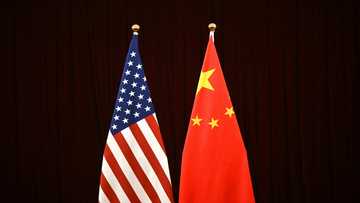US to raise tariffs on $18 bn of China imports including chips

Source: AFP
PAY ATTENTION: Leave your feedback about YEN.com.gh. Fill in this short form. Help us serve you better!
The United States is hiking tariffs on $18 billion worth of Chinese imports, targeting strategic sectors like electric vehicles, batteries, steel and critical minerals, the White House said Tuesday.
The decision -- which drew a fiery response from Beijing -- comes as President Joe Biden gears up for a re-run of his 2020 contest with Republican rival Donald Trump in November's election, with officials criticizing Trump's record on trade as they made the announcement.
The tariff rate on EVs is set to quadruple to 100 percent this year while the tariff for semiconductors will surge from 25 percent to 50 percent by next year, the White House said.
The action is aimed at encouraging China to "eliminate its unfair trade practices regarding technology transfer, intellectual property and innovation," it added.
This follows a review of tariffs imposed during a trade war between Washington and Beijing, during which then-president Trump introduced levies on some $300 billion in goods from China.
China's commerce ministry warned that the new tariffs would "severely affect the atmosphere for bilateral cooperation," urging Washington to cancel the measures.
Calling this a politicization of economic issues, Beijing added that it "resolutely opposes" the actions.
The so-called Section 301 investigation was the primary tool the Trump administration used to justify tariffs, and the US Trade Representative is required to look into the impact of the levies after four years.
Tuesday's actions were also taken under Section 301 of the Trade Act.
Beyond EVs and semiconductors, Washington is roughly tripling tariffs on some steel and aluminum products, and on lithium-ion EV batteries and battery parts.
The tariff rate on natural graphite and some other critical minerals will surge from zero to 25 percent, and that on solar cells doubles to 50 percent.
But some tariff hikes, such as on non-EV lithium-ion batteries, take effect later to allow for a transitional period as the country builds up its domestic battery production, a senior US official said on condition of anonymity.
Beijing's foreign ministry said it "opposes unilateral tariff hikes in violation of WTO rules" when asked about reports of the new measures.
China "will take all necessary measures to safeguard its legitimate rights and interests", spokesperson Wang Wenbin said on Tuesday.
Excess capacity

Source: AFP
The latest moves impact both products already targeted by the Trump tariffs as well as additional ones.
The levies will ensure that investments in jobs, spurred by Biden's policies, are not undercut by "underpriced exports from China," National Economic Advisor Lael Brainard said.
The Biden administration has pumped massive funding into areas like semiconductor manufacturing and research, alongside efforts to boost green investments.
But Brainard accused Beijing of powering its growth "at the expense of others."
"As a result of unfair practices, China's anticipated manufacturing capacity in solar is more than double the forecasts of near term global demand," she said.
Brainard also took aim at the Trump administration, saying it "failed to follow through" with investments, and to ensure China complied with a deal marking a truce in the trade war.
'Pre-emptive strike'
Hiking tariffs on Chinese EVs would be "a pre-emptive strike" given that few such cars are imported, said Paul Triolo, partner for China at Albright Stonebridge Group.
The impact from EV tariffs alone is expected to be minimal.
"It is really a signal to US automakers that the Biden administration is protecting the industry from Chinese EVs," he told AFP.
But tariffs covering EV batteries and supply chains would be "a much bigger issue, because of the dominance of Chinese companies in the finished battery space and for critical minerals across the battery supply space," he said.
China is likely to retaliate with tariff increases of its own, Triolo said.
Beijing is likelier to retaliate strongly if Washington takes measures seen as suppressing Chinese companies, like imposing more trade restrictions on semiconductor firms.
Treasury Secretary Janet Yellen told reporters Monday, when asked about possible tariffs: "I'm hopeful that they will see that the actions that we're taking are targeted."
She added in a statement that issues like overcapacity "will not be solved in a day," and that she would continue to directly address concerns with Chinese counterparts.
New feature: Сheck out news that is picked for YOU ➡️ click on “Recommended for you” and enjoy!
Source: AFP





